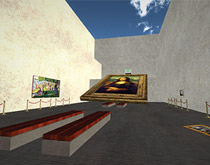The graduate student is in Tokyo, standing before hundreds of game developers and journalists. “My name is Albert Shih,” he says, “and I’m very nervous.” As he hears the translator repeat this in Japanese, he cringes, realizing the line wasn’t funny, as he had hoped.
 Shih is making a presentation as part of Sense of Wonder Night, a popular event at the Tokyo Game Show—an international gaming convention that draws more than 200,000 gamers and industry members. Shih traveled from Carnegie Mellon’s Entertainment Technology Center to Tokyo after being selected as one of only nine presenters from 125 applicants to present his game, called Museum of Simulation Technology. Many of the other entries came from professional game developers, so Shih, as a student, is thrilled to be here. After speaking for a few minutes about his creation, he switches to a demonstration, relaxing now that he can let Museum speak for itself.
Shih is making a presentation as part of Sense of Wonder Night, a popular event at the Tokyo Game Show—an international gaming convention that draws more than 200,000 gamers and industry members. Shih traveled from Carnegie Mellon’s Entertainment Technology Center to Tokyo after being selected as one of only nine presenters from 125 applicants to present his game, called Museum of Simulation Technology. Many of the other entries came from professional game developers, so Shih, as a student, is thrilled to be here. After speaking for a few minutes about his creation, he switches to a demonstration, relaxing now that he can let Museum speak for itself.
The game uses the idea of forced perspective—an optical illusion where objects seem to change size based on their angles—for example, when tourists take photos that appear as if they’re holding up the Leaning Tower of Pisa. In Museum, the objects do change size, rather than being just illusions. The ability to manipulate objects allows the player to navigate the world in a unique way, creating an impromptu jungle gym out of anything from the Eiffel Tower to the Mona Lisa to the Moon in order to climb to an exit and move on to the next level.
When Shih (CS’12, CMU’14) first came to CMU from Taiwan as an undergraduate, intending to major in physics, he had no idea he’d end up in Tokyo presenting his own video game. In fact, video games were just something his parents scolded him for playing too often. But after designing his own game in an introductory computer science class, he was hooked and transferred into computer science. He learned about the Entertainment Technology Center, where he could earn a graduate degree making video games. His thinks, “Uh, yeah, I want to do that!”
Despite his nerves in Tokyo, he manages to charm the audience as does his game. Not only does he win the Best Technological Game Award, he also goes home with the Audience Choice Award. Back at the ETC, Shih and a team of his classmates are further developing Museum.
—Olivia London (DC’13)



